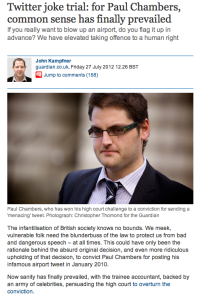 The “Twitter joke case” – on which I posted earlier in the week – prompted an interesting article in yesterday’s Guardian. In it, John Kampfner, former chief executive of Index on Censorship, argues that “the public, both Twitter-using and non-Twitter-using, have elevated taking offence to a human right. We see hurt and danger around every corner and lurking in every missive. For sure, some are beyond the pale. One or two might be prosecutable. But, for the most part we should develop a thicker skin, keep calm and carry on.” (He wrote this before news broke about tweets concerning Olympic diver Tom Daley – but Kampfner has now written a further piece in the light of that story, on which see also this article by Joshua Rozenberg.)
The “Twitter joke case” – on which I posted earlier in the week – prompted an interesting article in yesterday’s Guardian. In it, John Kampfner, former chief executive of Index on Censorship, argues that “the public, both Twitter-using and non-Twitter-using, have elevated taking offence to a human right. We see hurt and danger around every corner and lurking in every missive. For sure, some are beyond the pale. One or two might be prosecutable. But, for the most part we should develop a thicker skin, keep calm and carry on.” (He wrote this before news broke about tweets concerning Olympic diver Tom Daley – but Kampfner has now written a further piece in the light of that story, on which see also this article by Joshua Rozenberg.)
All of this raises a difficult but important question. At what point – if any – does one person’s right of freedom of speech have to yield because its exercise might offend others? This is an issue with which the courts have increasingly had to grapple since the Human Rights Act 1998 entered into force. The Act gives effect in UK law to certain parts of the European Convention on Human Rights – including Article 10. It says that: “Everyone has the right to freedom of expression.” But, like many provisions in the Convention, the right is limited. In particular, Article 10 says that free speech can be restricted to the extent that is
necessary in a democratic society, in the interests of national security, territorial integrity or public safety, for the prevention of disorder or crime, for the protection of health or morals, for the protection of the reputation or rights of others, for preventing the disclosure of information received in confidence, or for maintaining the authority and impartiality of the judiciary.
When, then, does the right to speak freely give way to the need not to offend others? This question arises in a number of contexts. For example, section 5 of the Public Order Act 1986 criminalises (in certain circumstances) the use of “insulting” words or behaviour – but the “Free Free to Insult Me” campaign argues that free speech should not be limited in this way.
The extent, if any, of the right not to be offended also arose in 2003 in the ProLife Alliance case, in which a group opposed to abortion sought to air a political broadcast – showing images of mutilated aborted foetuses – during an election campaign. TV stations refused to show it, arguing, in effect, that ProLife Alliance’s right to free speech – which extends to a right to display images – could be restricted because of the offensiveness of the images concerned.
The Appellate Committee of the House of Lords (since replaced by the UK Supreme Court) ruled, by a majority, in favour of the broadcasters. One of the majority judges, Lord Nicholls, said that members of the public were entitled to be protected “from being unduly distressed in their own homes”. But in a strong dissenting judgment, Lord Scott disagreed. He said:
In a mature democracy political parties are entitled, and expected, to place their policies before the public so that the public can express its opinion on them at the polls. The constitutional importance of this entitlement and expectation is enhanced at election time … Voters in a mature democracy may strongly disagree with a policy being promoted by a televised party political broadcast but ought not to be offended by the fact that the policy is being promoted nor, if the promotion is factually accurate and not sensationalised, by the content of the programme. Indeed, in my opinion, the public in a mature democracy are not entitled to be offended by the broadcasting of such a programme …
A broadcasters’ mind-set that rejects a party election television programme, dealing with an issue of undeniable public importance such as abortion, on the ground that large numbers of the voting public would find the programme “offensive” denigrates the voting public, treats them like children who need to be protected from the unpleasant realities of life, seriously undervalues their political maturity and can only promote the voter-apathy to which I have referred.
Lord Scott makes an important point here. He recognises that the acceptable limits of free speech depend on the context, and on the purpose for which someone is seeking to express themselves. The gratuitous publication of “offensive” images for no purpose except to shock might well exceed the limits of the right of free speech – but purposeful publication as part of a serious political debate was (or arguably ought to have been) a different matter. In this sense, then, there is a “hierarchy” of speech – some forms being more valuable, and so more deserving of protection, than others. This does not mean that “low-level” speech – such as the Twitter joke about blowing up an airport – deserves no protection. But it does mean that it is less important, and so more susceptible to lawful restriction, than other, worthier forms of expression.
